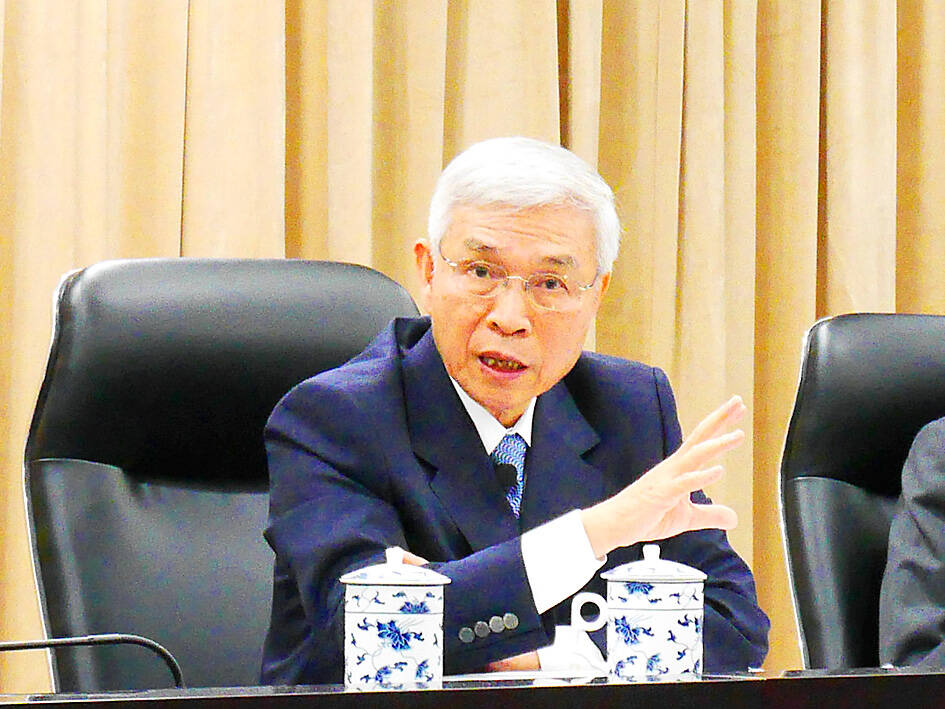Central bank Governor Yang Chin-long (楊金龍) has earned the fourth “A” grade of his career, in an annual report issued by the New York-based Global Finance magazine.
In the Central Banker Report Cards 2023 released by Global Finance overnight, Yang was listed among eight central bankers in the world who received an “A” grade, the magazine said in a statement.
Yang said yesterday that his grade was the result of the efforts made by the government and the people, as well as his colleagues at the central bank.

Photo: Chen Mei-ying, Taipei Times
This year’s Central Banker Report Cards, published annually by Global Finance since 1994, graded the central bank governors of 101 key countries, territories and districts in the world, including the EU, the Eastern Caribbean Central Bank, the Bank of Central African States and the Central Bank of West African States.
Grades are awarded on a scale from “A” to “F” for success in inflation control, economic growth goals, currency stability and interest rate management, with an “A” representing an excellent performance and an “F” signifying outright failure, according to Global Finance.
Yang, who has been working at Taiwan’s central bank since 1989 and became its governor in 2018, received an “A” grade in the annual central banker report in 2019, 2020 and 2022, and an “A-” in 2021.
His predecessor Perng Fai-nan (彭懷南) has the distinction of being the only central banker in the world to have earned the top grade 14 times, gaining straight A’s from 2005-2017.
On the Global Finance 2023 report card, the other central bankers who earned a grade “A” were Brazil’s Roberto Campos Neto, Israel’s Amir Yaron, Mauritius’ Harvesh Kumar Seegolam, New Zealand’s Adrian Orr, Paraguay’s Jose Cantero Sienra, Peru’s Julio Velarde and Uruguay’s Diego Laba, according to the 2023 report.
At the top of the class, three central bankers — India’s Shaktikanta Das, Switzerland’s Thomas J. Jordan and Vietnam’s Nguyen Thi Hong — received an “A+” grade this year, the report showed.
According to Global Finance, 10 central bankers earned an “A-” grade. They are Colombia’s Leonardo Villar, Dominican Republic’s Hector Valdez Albizu, Iceland’s Asgeir Jonsson, Indonesia’s Perry Warjiyo, Mexico’s Victoria Rodriguez Ceja, Morocco’s Abdellatif Jouahri, Norway’s Ida Wolden Bache, South Africa’s Lesetja Kganyago, South Korea’s Rhee Chang-yong and Sri Lanka’s Nandalal Weerasinghe.

TAKING STOCK: A Taiwanese cookware firm in Vietnam urged customers to assess inventory or place orders early so shipments can reach the US while tariffs are paused Taiwanese businesses in Vietnam are exploring alternatives after the White House imposed a 46 percent import duty on Vietnamese goods, following US President Donald Trump’s announcement of “reciprocal” tariffs on the US’ trading partners. Lo Shih-liang (羅世良), chairman of Brico Industry Co (裕茂工業), a Taiwanese company that manufactures cast iron cookware and stove components in Vietnam, said that more than 40 percent of his business was tied to the US market, describing the constant US policy shifts as an emotional roller coaster. “I work during the day and stay up all night watching the news. I’ve been following US news until 3am

UNCERTAINTY: Innolux activated a stringent supply chain management mechanism, as it did during the COVID-19 pandemic, to ensure optimal inventory levels for customers Flat-panel display makers AUO Corp (友達) and Innolux Corp (群創) yesterday said that about 12 to 20 percent of their display business is at risk of potential US tariffs and that they would relocate production or shipment destinations to mitigate the levies’ effects. US tariffs would have a direct impact of US$200 million on AUO’s revenue, company chairman Paul Peng (彭雙浪) told reporters on the sidelines of the Touch Taiwan trade show in Taipei yesterday. That would make up about 12 percent of the company’s overall revenue. To cope with the tariff uncertainty, AUO plans to allocate its production to manufacturing facilities in

Six years ago, LVMH’s billionaire CEO Bernard Arnault and US President Donald Trump cut the blue ribbon on a factory in rural Texas that would make designer handbags for Louis Vuitton, one of the world’s best-known luxury brands. However, since the high-profile opening, the factory has faced a host of problems limiting production, 11 former Louis Vuitton employees said. The site has consistently ranked among the worst-performing for Louis Vuitton globally, “significantly” underperforming other facilities, said three former Louis Vuitton workers and a senior industry source, who cited internal rankings shared with staff. The plant’s problems — which have not

COLLABORATION: Given Taiwan’s key position in global supply chains, the US firm is discussing strategies with local partners and clients to deal with global uncertainties Advanced Micro Devices Inc (AMD) yesterday said it is meeting with local ecosystem partners, including Taiwan Semiconductor Manufacturing Co (TSMC, 台積電), to discuss strategies, including long-term manufacturing, to navigate uncertainties such as US tariffs, as Taiwan occupies an important position in global supply chains. AMD chief executive officer Lisa Su (蘇姿丰) told reporters that Taiwan is an important part of the chip designer’s ecosystem and she is discussing with partners and customers in Taiwan to forge strong collaborations on different areas during this critical period. AMD has just become the first artificial-intelligence (AI) server chip customer of TSMC to utilize its advanced